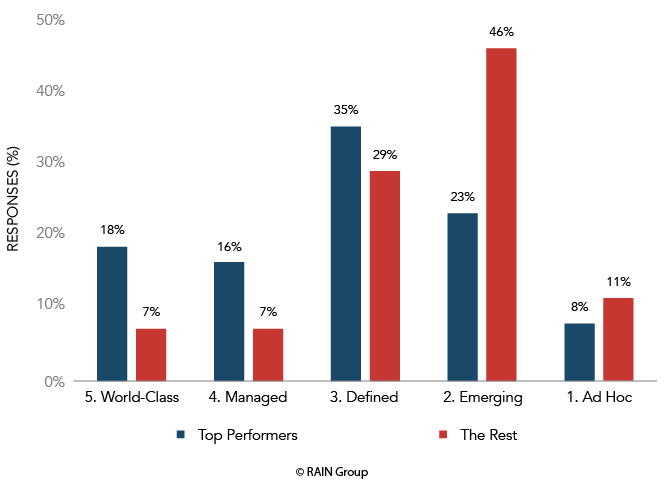As sales managers, it’s our job to drive sales performance. The question is: what actions, specifically, should we take to do that?
Recently, the RAIN Group Center for Sales Research undertook a major study to determine what those actions should be. The results were fascinating, especially as they relate to how sales process correlates to top performance.
For our Top-Performing Sales Organization research, we studied 472 sellers and sales managers (80% of our research participants were sales managers and leaders) globally at mid-size and large companies.
Our goal was to find out what separates Top Performers those with higher proposal win rates, greater likelihood to grow revenue, greater likelihood to hit their organization’s sales targets, and greater likelihood to sell with strong prices from The Rest.
One area that stood out as significantly important was sales process maturity. We asked our study participants to rate their process on a 5-point scale:
1.Ad Hoc (Chaos): No consistent process or framework for planning to win opportunities.
2.Emerging: Some consistency and planning framework, but still work to do to standardize and make it complete.
3.Defined: Our opportunity management process is defined and we have a tool to guide us to win opportunities.
4.Managed (Adoptive): Number 3, plus it’s easy to use, includes specific details and guidance for selling, the process is managed well and helpful to sellers.
5.World-Class (Adaptive): Number 4, plus it’s always being measured and improved, it includes best practices for strategies and tactics across the sales cycle, and the process and planning tools are embedded in sellers? workflow and technology.
It turns out that Top Performers were much more likely to have more mature sales processes than The Rest, as shown in Figure 1 below.
Figure 1. Sales Process Maturity by Sales Performance

What does this mean for sales managers and leaders? Recently, there’s been backlash against sales leaders focusing on improving their sales processes. For example, the following was published in the Harvard Business Review:
Sales leaders have long fixated on process discipline… But recently sales has been caught off guard by a dramatic shift in customers? buying behavior. Even as leadership has tightened compliance with the processes that have served so well, sales performance has grown increasingly erratic? The sales machine is stalling?. Leaders must abandon their fixation on process compliance and embrace a flexible approach to selling driven by sales reps? reliance on insight and judgment.
Based on our research and experience, advice to abandon the sales and opportunity management processes is misguided. In fact, we have found the opposite to be true: a focus on sales process, strong process management techniques, and discipline to follow the process doesn’t hamper insight and judgment, it unleashes them. The correlation of sales process design- and maturity-related questions to Elite and Top Performers speaks to the critical importance of sales process.
Along with sales process maturity, we analyzed the construct of the sales process itself. Five questions in our study focused on topics related to customer focus and value.
1.Our sales organization focuses on driving maximum value for the customer
2.Our sales force structure is aligned with the way our customers prefer to buy from us
3.Our sales process is customer-focused and maps to our buyers? buying processes
4.Our sales process is flexible to apply to our buyers? various roles and situations
5.Our company leaders prioritize developing sellers to be as valuable to our buyers as possible
Questions 3 and 4 are directly related to sales process, and the other questions highly affect or are enabled by sales process. For example, the sales organization can’t drive maximum value for the customer if the sales process is too seller vs. buyer focused, and if sellers don’t have the training and resources they need during the sales process to drive value.
In any case, 16% of our study participants agreed with all five questions. We compared this Value Driving Sales Organization group with the 84% who didn’t agree with the questions.
The differences between the 16% that were Value Driving and the bottom 84% were stark. Value-Driving Sales Organizations:
-Were more likely to grow revenue (90% vs. 72%)
-Had higher win rates from proposal to close (54% vs. 45%)
-Had lower undesired turnover in their sales force (27% vs. 39%)
-Were more likely to have effective sales training (42% vs. 12%)
-Had more sellers who actively pursue top performance (85% vs. 50%)
All in, there are three takeaways for sales managers:
1.Sales process is important. The more mature it is, the more helpful it is to sellers, and the more it is adapted and improved over time, the more you will help your sellers achieve top performance.
2.If you want stronger business results and a more motivated sales force, infuse value in your sales processes.
3.Having a strong sales process isn’t enough. Organizations must train the sales force on an ongoing basis to make best use of the sales process, and make sure that training is highly effective.
About the Author
President of RAIN Group, Mike Schultz is world-renowned as a consultant and sales expert. He isbestselling author of Rainmaking Conversations: How to Influence, Persuade, and Sell in Any Situation (Wiley, 2011) and Insight Selling: Surprising Research on What Sales Winners Do Differently (Wiley, 2014), and was named the Top Sales Thought Leader globally in 2011. Mike and the team at RAIN Group have worked with organizations such as Hitachi, BNY Mellon, HP, SAP, Boeringer Ingelheim, Deloitte, Harvard Business School, and dozens of others to unleash their sales potential. As a sales leader himself, Mike oversaw a sales force at a leading business-to-business company, engineering growth in his division by 800% in a four year period while increasing margins significantly. Mike has also personally sold tens of millions of dollars in products and services to companies across industries and of various sizes. News outlets such as Bloomberg Businessweek, The Globe and Mail, Inc. Magazine, and MSNBC, and hundreds of others have featured Mike’s original articles and white papers, and frequently quote him as an expert. Mike’s most recent research includes Rainmaking Conversations, What Sales Winners Do Differently,and Benchmark Report on High Performance in Strategic Account Management. Along with his books, Mike has written hundreds of articles, case studies, research reports, and other publications in the areas of selling and marketing. Mike is a graduate of Brandeis University in Waltham, MA with a B.A. in American Studies, and holds an MBA from the F.W. Olin Graduate School of Business at Babson College. Mike also enjoys fly fishing and golf, and actively studies and teaches the traditional martial arts of Seirenkai Karate and Jujitsu, holding the ranks of third degree black belt and Sensei. He lives on a lake west of Boston.









